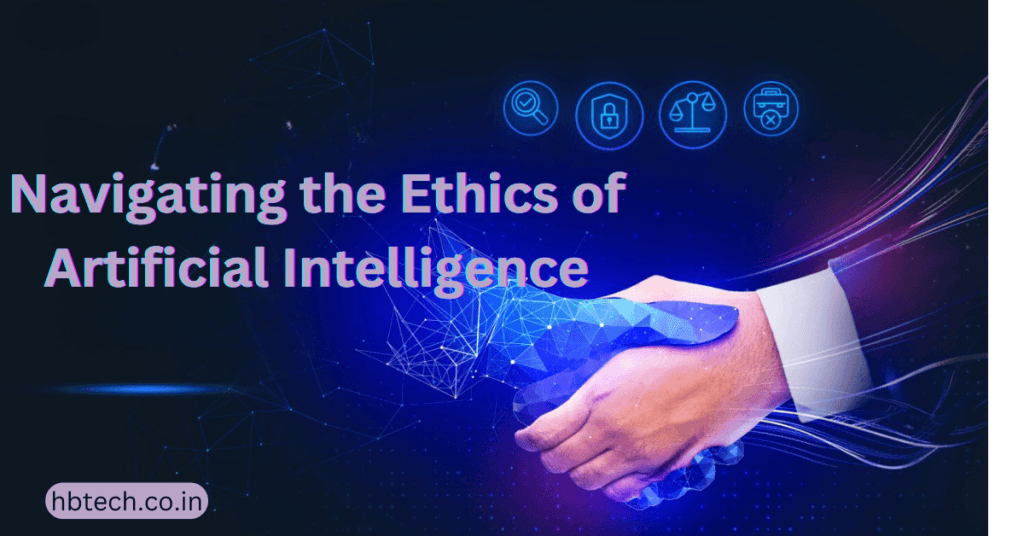Artificial Intelligence (AI) is becoming a bigger part of our everyday lives. It’s helping industries grow, driving innovation and changing how we interact with technology. But as AI becomes more advanced, it’s important to think about the ethical questions it raises. This blog explores key ideas about AI ethics and why they matter.
What is Navigating the Ethics of AI?
Navigating the ethics of AI means understanding and addressing the moral issues that come with creating and using AI systems. It’s about finding the right balance between using technology to advance society and making sure it doesn’t cause harm. This involves more than just following laws—it’s about being fair, honest and responsible.
What is the Ethics of Artificial Intelligence?
The ethics of artificial intelligence focuses on the moral principles and social impacts of AI technologies. It considers how AI is designed, how it makes decisions and how it affects people. Some key questions include :
- Who is responsible if an AI system makes a mistake?
- How can we remove biases from AI systems?
- Where should we draw the line on how much influence AI has on our lives?
What Are the 5 Ethical Principles of AI?
To guide the responsible use of AI, experts have outlined five main principles:
- Transparency : AI should work in a way that people can understand. Clear communication builds trust and accountability.
- Fairness : AI must be designed to treat everyone equally and avoid bias or discrimination.
- Accountability : Developers and organizations should take responsibility for how AI systems behave and the outcomes they produce.
- Privacy : It’s crucial to protect people’s personal information and handle data securely.
- Safety and Security : AI systems should be safe to use, free from errors and protected against misuse or hacking.
Importance of Ethics in Artificial Intelligence
Ethics in AI is critical to ensure that technology benefits everyone. Without ethical guidelines, AI could deepen inequalities, reinforce biases and reduce public trust. Focusing on ethics helps to:
- Build confidence in AI systems.
- Encourage innovation that serves society as a whole.
- Prevent misuse or harmful consequences of AI technologies.
Ethical Aspects of AI
AI brings up many ethical concerns, such as :
- Bias : AI can reflect and amplify biases in the data it’s trained on, leading to unfair outcomes.
- Autonomy : Deciding how much decision-making power AI should have versus humans.
- Job Loss : Automation can replace jobs, creating economic and social challenges.
- Environmental Impact : The energy used to power AI systems can have negative effects on the environment.
Addressing these issues requires collaboration between different fields, including technology, law and social sciences.
Artificial Intelligence and Ethics PDF
If you want to explore AI ethics further, there are many detailed resources available in PDF format, such as research studies and policy documents. These resources provide valuable insights for developers, policymakers and educators working to create ethical AI systems.
Ethics of Artificial Intelligence & Automation
AI and automation are transforming industries by making processes faster and more efficient. However, they also raise ethical questions, such as:
- Job Displacement : Automation can lead to job losses, which may create economic inequality.
- Decision-Making : When AI is used in critical areas like healthcare or finance, it requires strict ethical oversight.
- Accountability : It’s important to clarify who is responsible when AI systems fail or cause harm.
By addressing these concerns, we can ensure that AI and automation help society while minimizing risks.
Navigating the ethics of AI is a vital step in shaping a future where technology works for everyone. Developers, governments and communities must work together to create ethical guidelines that ensure fairness, accountability and safety. By doing so, we can unlock AI’s full potential while protecting our shared values.
Frequently ASked Questions(FAQs)
What does it mean to navigate the ethics of AI?
Navigating the ethics of AI means understanding the moral challenges that arise from creating and using AI systems. It focuses on balancing technological progress with social responsibility to ensure AI benefits society without causing harm. This involves fairness, honesty, and accountability in all stages of AI development and use.
Why are ethics important in artificial intelligence?
Ethics in AI are crucial to ensure that technology is fair, trustworthy, and beneficial to everyone. Without ethical guidelines, AI could reinforce biases, deepen inequalities, and erode public trust. By focusing on ethics, we can encourage innovation that aligns with societal values and prevents potential misuse or harm.
What are the five key principles of ethical AI?
The five main ethical principles for AI are:
Transparency: Making AI systems understandable and accountable.
Fairness: Designing AI to treat all users equitably and avoid bias.
Accountability: Ensuring developers and organizations take responsibility for AI systems.
Privacy: Protecting user data and managing it securely.
Safety and Security: Building AI systems that are robust, error-free, and protected from misuse.What ethical concerns are associated with AI and automation?
Key ethical concerns include:
Bias: AI systems may amplify existing biases in data, leading to unfair outcomes.
Job Loss: Automation can displace workers, creating economic challenges.
Decision-Making: Relying on AI for critical decisions in areas like healthcare or finance requires strict oversight.
Environmental Impact: The energy demands of AI systems can negatively affect the environment.









